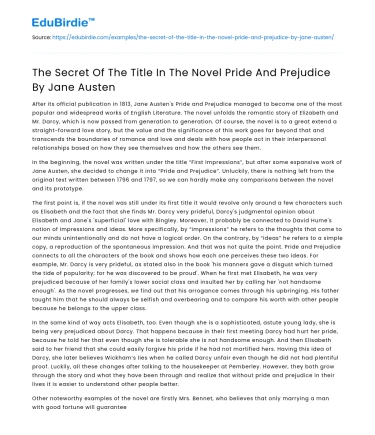After its official publication in 1813, Jane Austen's Pride and Prejudice managed to become one of the most popular and widespread works of English Literature. The novel unfolds the romantic story of Elizabeth and Mr. Darcy, which is now passed from generation to generation. Of course, the novel is to a great extend a straight-forward love story, but the value and the significance of this work goes far beyond that and transcends the boundaries of romance and love and deals with how people act in their interpersonal relationships based on how they see themselves and how the others see them.
In the beginning, the novel was written under the title “First Impressions”, but after some expansive work of Jane Austen, she decided to change it into “Pride and Prejudice”. Unluckily, there is nothing left from the original text written between 1796 and 1797, so we can hardly make any comparisons between the novel and its prototype.
The first point is, if the novel was still under its first title it would revolve only around a few characters such as Elisabeth and the fact that she finds Mr. Darcy very prideful, Darcy's judgmental opinion about Elisabeth and Jane's 'superficial' love with Bingley. Moreover, it probably be connected to David Hume's notion of impressions and ideas. More specifically, by “impressions” he refers to the thoughts that come to our minds unintentionally and do not have a logical order. On the contrary, by “ideas” he refers to a simple copy, a reproduction of the spontaneous impression. And that was not quite the point. Pride and Prejudice connects to all the characters of the book and shows how each one perceives these two ideas. For example, Mr. Darcy is very prideful, as stated also in the book 'his manners gave a disgust which turned the tide of popularity; for he was discovered to be proud'. When he first met Elisabeth, he was very prejudiced because of her family's lower social class and insulted her by calling her 'not handsome enough'. As the novel progresses, we find out that his arrogance comes through his upbringing. His father taught him that he should always be selfish and overbearing and to compare his worth with other people because he belongs to the upper class.
In the same kind of way acts Elisabeth, too. Even though she is a sophisticated, astute young lady, she is being very prejudiced about Darcy. That happens because in their first meeting Darcy had hurt her pride, because he told her that even though she is tolerable she is not handsome enough. And then Elisabeth said to her friend that she could easily forgive his pride if he had not mortified hers. Having this idea of Darcy, she later believes Wickham’s lies when he called Darcy unfair even though he did not had plentiful proof. Luckily, all these changes after talking to the housekeeper at Pemberley. However, they both grow through the story and what they have been through and realize that without pride and prejudice in their lives it is easier to understand other people better.
Other noteworthy examples of the novel are firstly Mrs. Bennet, who believes that only marrying a man with good fortune will guarantee her daughters' pride. Secondly, there is Lady Catherine, Darcy's aunt, who as an aristocrat does not accept any lower-class woman for her nephew as a wife and feels challenged by Elisabeth. Finally, there is also Mr. Collins, the epitome of pride, because he would do anything for it.
Another key point is that, it is very common and especially nowadays that publishers want to have the same dust wrapper for the novels written by the same author, because they believe that if the readers loved the first approach, they will probably love the second one. That is exactly what happened with Pride and Prejudice, but 19th century-style. After the great success of her first novel Sense and Sensibility, Austen’s publisher asked if they could remain in the same pattern of Noun-and-Noun and so she did.
Taking all the above into consideration, Pride and Prejudice is a novel that covers a wide range of topics, focusing on how first impressions can sometimes be wrong and how we should reconsider and reevaluate our decisions. But the main point is that all these come from the pride and prejudice that each one of us has inside of them and how they let them define their lives. It also connects marriage with pride and how that shows someone’s social status or the respect they deserve from others. So, I personally believe that following her publisher's orders to change the title was the right decision to do.






 Stuck on your essay?
Stuck on your essay?

